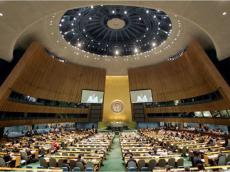|
|
TODAY.AZ / Politics
UN Assembly to beef co-op with Azerbaijan up
20 June 2013 [09:50] - TODAY.AZ
 Source: AzerNews
Source: AzerNewsThe UN General Assembly intends to expand cooperation with Azerbaijan, Vuk Jeremic, President of the 67th Session of the United Nations General Assembly, said in Baku on June 18.
As part of his visit to Azerbaijan, Jeremic met with Communications and Information Technologies Minister Ali Abbasov, the ICT ministry said.
Jeremic said the energy and information technologies sectors were in focus during the discussions on sustainable development at the United Nations. Jeremic recalled that he had familiarized himself with the achievements of Azerbaijan and added that the country has achieved good results in the two mentioned fields.
The construction project on the Trans-Eurasian Information Super Highway (TASIM) was discussed at the meeting along with prospects of cooperation between Azerbaijan and the UN General Assembly.
Azerbaijan is currently involved in two major transnational projects - as a coordinator of TASIM, on which the UN GA passed a second resolution in 2012 supporting the project politically, and as one of the main initiators and participants of the Europe Persia Express Gateway (EPEG) project, which has already been launched.
Noting that 2013 was declared the ICT Year in Azerbaijan and providing information about the country's ICT achievements, Abbasov spoke about ongoing national and regional projects in this sector.
Earlier, Abbasov said establishment of the alliance in the frame of TASIM will be formally announced in September. Work in this area is already underway and Azerbaijan is a coordinator of the alliance.
TASIM is a project of regional importance, whose aim is laying a transnational fiber-optic line covering the countries of Eurasia from Western Europe to Eastern Asia.
The project envisages the creation of a major transit link from Frankfurt to Hong Kong. The line will combine major centers of information exchange in Europe and Asia.
The transit line will stretch through China, Kazakhstan, Azerbaijan, Georgia and Turkey to Germany. A reserve North transit line will pass through the territory of Russia, Ukraine and Poland.
Currently, the project connects five countries - Azerbaijan, China, Kazakhstan, Russia and Turkey, while involvement of Georgia, Bulgaria and Ukraine is expected in the near future.
The project is designed to connect 20 countries and its implementation will eliminate the "information gap" between Western Europe and the Pacific region.
URL: http://www.today.az/news/politics/123765.html
 Print version
Print version
Views: 1213
Connect with us. Get latest news and updates.
See Also
- 07 November 2025 [14:30]
Georgian PM: Peace between Azerbaijan and Armenia vital for regional prosperity - 07 November 2025 [13:50]
President Ilham Aliyev receives delegation led by Slovak Deputy Prime Minister - 07 November 2025 [12:12]
Will Simonyan ever get tired of dancing on bones? - 07 November 2025 [11:42]
Milli Majlis committees discuss draft law on Azerbaijan’s 2026 state budget - 07 November 2025 [10:10]
Azerbaijan and NATO: The North Atlantic bloc has something to remember - 06 November 2025 [13:13]
Armenia began to receive benefits from defeat in war - on eve of anniversary of Victory of Azerbaijan - 06 November 2025 [12:18]
President Ilham Aliyev receives NATO delegation - 06 November 2025 [12:11]
Azerbaijan, Islamic Development Bank discuss cooperation in digital and transport sectors - 05 November 2025 [13:42]
President Ilham Aliyev awards Baku Metro employees - decree - 05 November 2025 [13:38]
Baku hosts NATO Combat Readiness Evaluation course for Land Force
Most Popular
 Armenia began to receive benefits from defeat in war - on eve of anniversary of Victory of Azerbaijan
Armenia began to receive benefits from defeat in war - on eve of anniversary of Victory of Azerbaijan
 Azerbaijan and NATO: The North Atlantic bloc has something to remember
Azerbaijan and NATO: The North Atlantic bloc has something to remember
 President Ilham Aliyev receives NATO delegation
President Ilham Aliyev receives NATO delegation
 Baku launches full-scale preparations for fifth Victory Day Parade
Baku launches full-scale preparations for fifth Victory Day Parade
 Azerbaijan unveils Chinese air defense system ahead of Victory Parade
Azerbaijan unveils Chinese air defense system ahead of Victory Parade
 Apple said to have slammed EU over digital market rules
Apple said to have slammed EU over digital market rules
 Azerbaijani Navy delegation visits Karachi for PIMEC-2025
Azerbaijani Navy delegation visits Karachi for PIMEC-2025
